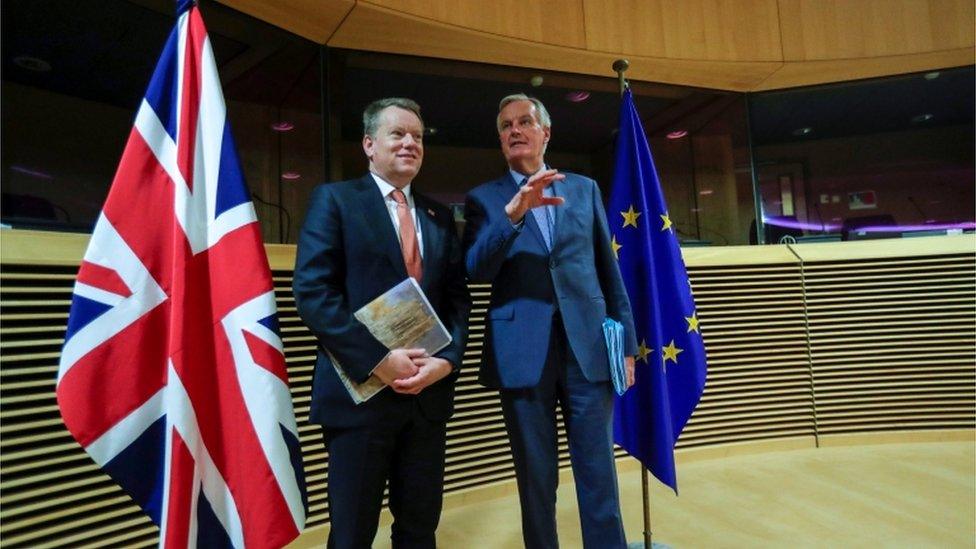Brexit: UK will refuse any transition extension request
- Published
- comments

The negotiators met face-to-face before the virus outbreak halted meetings
The UK will refuse to extend the Brexit transition period, even if the EU requested a delay, Downing Street says.
A spokesman said any extension would keep the UK bound by EU rules when it instead "needs flexibility" to deal with coronavirus.
The transition period, due to end on 31 December, was intended to allow the two sides to negotiate a trade deal.
On Wednesday, UK and EU negotiators agreed to hold three further rounds of trade talks.
Downing St added that an extension would "prolong the delay and uncertainty" around Brexit.
David Frost, the UK's chief negotiator, re-iterated the government's position on Twitter.
Allow X content?
This article contains content provided by X. We ask for your permission before anything is loaded, as they may be using cookies and other technologies. You may want to read X’s cookie policy, external and privacy policy, external before accepting. To view this content choose ‘accept and continue’.
Mr Frost and the European Commission's chief negotiator, Michel Barnier, discussed progress via video conference on Wednesday.
The new timetable was confirmed in a joint statement, which described Wednesday's talks as "constructive".
Downing Street has consistently said it is committed to agreeing a deal by December 2020.
The dates have been set for three full weeks of talks commencing on 20 April, 11 May and 1 June.
Face to face talks were cancelled last month because of the coronavirus outbreak - and Mr Frost and Mr Barnier both spent a period in self-isolation due to the virus.
During Wednesday's meeting, the negotiating teams evaluated work that has taken place since both sides exchanged legal text in March.
The joint statement said that, while the work had helped to "identify all major areas of divergence and convergence", there was agreement that further negotiating rounds were needed "in order to make real, tangible progress in the negotiations by June".
Mr Frost and Mr Barnier also discussed the implementation of the Withdrawal Agreement.
Under the terms of the agreement with the EU, the UK has until the end of the year - during which it will continue to follow most Brussels rules - to reach a deal.
It was also agreed that specialised committees on Northern Ireland and on citizens' rights would also meet soon.
On Tuesday, Chancellor Rishi Sunak said the government wanted to see future relationship talks with the EU concluded by the end of this year.
He said: "I'm confident that that work can continue and hopefully reach a satisfactory conclusion, but we remain committed to the timeline that we set out."
The acting leader of the Liberal Democrats said the government's refusal to extend the transition period was "deeply irresponsible".
Sir Ed Davey said the government had failed "to recognise the severity of the coronavirus crisis faced by the UK and countries across the EU."